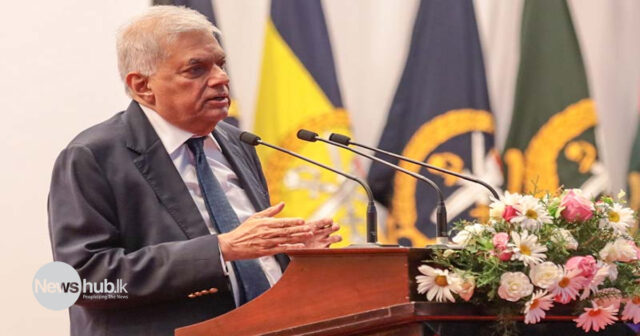President Ranil Wickremesinghe said that In order to face the global problems that may arise in the future, there should be unity between the Indian Ocean as well as Asian and African countries.
The President also pointed out that since the impact of the Ukraine-Russia war may be felt in the future, the country should also work towards self-sufficiency by establishing food security.
The President made these observations at the Academy auditorium on Friday (16) evening following the final presentation by the cadet officers of the 97th batch of the Diyatalawa Military Academy upon their completion of the course.
Following is the statement made by President Ranil Wickremesinghe:
The Commander of the Army has put me into a difficult position. You want me to comment on the Ukrainian situation to people who have done in-depth studies? That’s very difficult. It’s like you send me to the front and you got the commandant of the academy to train the guys who are facing me. So the difficult situation that I am in, I must commend you for the study that you have done on the subject and the presentation made to us.
It shows your commitment to study and research. No war can be won unless you study the situation and you do your research. That’s the only way that you can go ahead because war today is not just a clash of arms. Sometimes it’s not a war, it’s a shadow war. Then there are proxy wars. All these require study.
War takes place when diplomacy breaks down. Then they resort to a clash of arms today, directly or indirectly. What is Russia? What is Ukraine? That’s one of the biggest questions that you have to answer. You’ve done your history from Genghis Khan onwards, the changes that were made in the population by the Soviet Union and its predecessor, the Russian empire.
There is a common heritage between both these countries. You also have to remember more so that in World War Two, all the Russian battles from Stalingrad onwards were fought on Ukraine’s soil in the largest tank battle in the world. Two of the Soviet Union’s post-Stalin leaders, Khrushchev and Brezhnev both came from Ukraine. So these are also factors that have gone into a relationship that has that seen a severe disruption where a break from Russia seems to be taking place in the minds of the people.
As the commander of the Army says, there’s no direct military implication for us. But there is something that we can learn. I had the opportunity of talking about this with the Secretary-General at the UN and some other leaders when I was in Egypt. Summing up all of them said that Russia, why it trained itself for a strategic war, not to a conventional war.
Therefore, the fact that they could not get their combined command together is not surprising. Ukraine also did not have it, but they were trained by the British who had now established integrated command, and that’s where Ukraine got its strength.
As a result, what happened was Russians hoped to take over Kyiv and finish the war quickly. The biggest problem they had in going to Kyiv and stopping them was their supply of equipment because they focused on strategic wars.
They didn’t look at the equipment that they had for conventional wars. And more than that, it was an utterly corrupt system so where 100 grenades should be delivered someone delivered only 90, in some it was low quality. When Russia went into the war, there was a shortage of arms and ammunition and there were grenades that did not explode and guns that did not work.
So that shows the importance of ensuring honesty and ensuring a good supply, a good quartermaster, the one who would decide the fate of the army. So, as a result of the failure to capture Kyiv, now we’ve seen a new war developing within which neither side at the moment has shown the ability to win the war. Of course, you learn how the Ukrainians have made use of anti-tank weapons and missiles.
But also, remember in the figures you gave, the Russians had more than twice or three times the armaments of the Ukrainians. But armoured fighting vehicles were concerned; Ukraine had half of that of Russia. So take into mind that half of the Russians are deployed outside Ukraine, and then there was some advantage they got.
What would this strategy have something for you to work out? What are the consequences to us? Let’s start with economics. Yes, we are facing a double crisis, a foreign exchange crisis, and a food crisis at the moment, we may not have the severe impact of the food crisis from Ukraine, but next year it will.
Because what they’ve done is break the breadbasket of the world, Ukraine. You are not buying any of the grain from Russia. What we have is a locally manufactured crisis now, which can aggravate the food situation in Sri Lanka, which has led the government to start the food security campaign. Let us be self-sufficient in our food for the whole of next year and if necessary, the year after.
At the moment we seem to be successful in the Maha Season as far as rice is concerned. But I’m worried about next year if there is a long-standing drought. So we have to be on a watch for our food security and keep improving what we have.
The other problem is the Russian strategy. At the moment, Russia is determined to wreck the economy of Ukraine and Russia has succeeded in doing that.
All the lands which were used for the cultivation of grain are now battlefields. It’ll take years to clean up the land mines. We still have places to clean up in the North, so just imagine what it is like in Ukraine and how long it will take because the damage to the Ukraine economy is in the range of about a trillion dollars.
You will need a trillion dollars. It’s going to take a long time for that to come in. Russia has also suffered, but not that much. It can recover much faster and Russia’s strength has been its oil as its fuel. Russia and Saudi Arabia together are now leading fuel producers.
At the moment they are determined to curtail production and as the price of fuel goes up, it’s our country that won’t be able to have access to fuel. So these are some of the situations that we will have to face next year. The war has moved from the battlefield of economics onto the supply of food, fertilizer, and fuel. And how that will play out next year is an open question. We have to be prepared now as to how we will react to it.
There will be increases in fuel prices by February, and March, and we have to face it, in addition to the increase in fuel prices due to bad management and to repay loans. So that is one area in which we are going to have a crisis. At the moment we are making plans to overcome that. The other aspect of it that has come into our region is the political impact.
How are we to face this situation? What you are seeing now is a breakdown of a global order after World War Two, where Russia and America were the main powers. Then the New World Order came after the collapse of communism, which went on till 2010. Now that’s coming apart firstly between U.S. and Russia, now Europe and Russia.
Secondly, between US and China. Within the US they are also another reason you have to remember that the Russians backed President Trump, and that also is reflected in the policymaking of the US. It is reflected in the way the Democratic Party and the Republican Party view the war. So in this situation, what you are finding now is the world order is coming apart, what is going to take its place?
Recently, President Biden and President Xi had a discussion that seems to have come to a temporary understanding. But what happens firstly, this is becoming more and more a European affair, Where Europe is getting involved in the war.
The rest of the world is keeping out. Moreover, Asia, especially South Asia, and again, Africa has kept out of the war, making it completely European. Attempts to involve us in the war have not succeeded. Therefore, now it has become a European issue, but it can become a major global issue next year if we don’t look out.
Therefore, Asia, especially the Indian Ocean, and the Asian and African countries have proved that they do have clout, we do matter, and we have to ensure that we keep this unity in Asia and Africa.
-PMD-


































